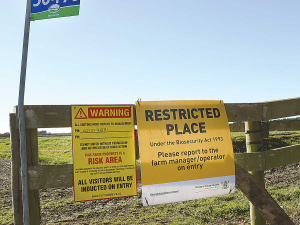DairyNZ opens applications for associate director role
DairyNZ is giving New Zealand farmers a unique opportunity to gain hands-on governance and leadership experience within the dairy sector.
 With the transition of the Mycoplasma bovis programme to a National Pest Management Plan, the number of biosecurity levies farmers pay will increase to seven.
With the transition of the Mycoplasma bovis programme to a National Pest Management Plan, the number of biosecurity levies farmers pay will increase to seven.
In its submission on proposed amendments to the Biosecurity Act, DairyNZ says its levy-paying members invested more than $60 million across the biosecurity system last year, through multiple biosecurity levies across several entities and legislative frameworks to collect this funding.
It points out that this adds unnecessary complexity, administrative cost and a lack of transparency with levy investment in biosecurity for farmers.
"We would like to see a more integrated and sustainably funded biosecurity system for the livestock sector that minimises risks through collective readiness and good biosecurity practices," it says.
"To support this, our farmers need certainty and consistency of the principles that will be applied to risk management, cost-sharing, and decision-making across the biosecurity system."
It also notes that delivery of services within the biosecurity system is fragmented, with inconsistent legislative and system settings to support effective funding and delivery.
"Different programmes often have the same stakeholders involved and this contributes to the frustration experienced by dairy farmers about regulatory burden and lack of transparency of levy investment."
DairyNZ notes that farmers currently fund the biosecurity system through six different levies and with the transition of the Mycoplasma bovis programme to a National Pest Management Plan (NPMP), this increases to seven.
"Dairy farmers may also contribute further funding to the biosecurity system when cattle are designated as beef cattle for slaughter and on the purchase of seed for arable crops."
It recommends that biosecurity levies consolidated into a single levy (or fewer levies) with the creation of a cross-industry organisation that integrates the deliver, and funding, of biosecurity services would be a more efficient way to recover costs and lessen administrative expense for industry and government.
The World Wide Sires National All Day Breeds Best Youth Camp Best All Rounder plaudit has become family affair, with 2026 Paramount Cup winner Holly Williams following in her sister Zara's footsteps.
DairyNZ is giving New Zealand farmers a unique opportunity to gain hands-on governance and leadership experience within the dairy sector.
Herd improvement company LIC has posted a 5.2% lift in half-year revenue, thanks to increasing demand for genetics.
According to the latest Fresh Produce Trend Report from United Fresh, 2026 will be a year where fruit and vegetables are shaped by cost pressures, rapid digital adoption, and a renewed focus on wellbeing at home.
The Roar is a highlight of the game hunting calendar in New Zealand, with thousands of hunters set to head for the hills to hunt male stags during March and April.
OPINION: The past few weeks have been tough on farms across the North Island: floods and storms have caused damage and disruption to families and businesses.

OPINION: Meanwhile, red blooded Northland politician Matua Shane Jones has provided one of the most telling quotes of the year…
OPINION: This old mutt has been around for a few years now and it seems these ‘once in 100-year’ weather…